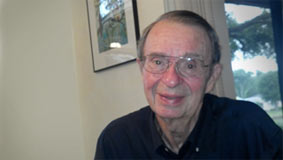http://www.news-journalonline.com/article/20120826/LIVING/308269989?p=2&tc=pg
Medical Miracle
Flagler man is pancreatic cancer-free after Stage 4 diagnosis
Florida Hospital Flagler's Oncologist Dr. Padmaja Sai has been treating Ronald Sturtevant for pancreatic cancer.
N-J/David MasseyPublished: Sunday, August 26, 2012 at 3:44 p.m.
Last Modified: Sunday, August 26, 2012 at 3:44 p.m.
PALM COAST -- By the time Florida Hospital oncologist Dr. Padmaja Sai diagnoses patients with pancreatic cancer, she is usually faced with the daunting task of telling them there is little she can do.
"We don't use the word cure, and, at that point, we are trying to prolong their life with palliative care," Sai said. "We try our best, but, when it's time to say goodbye, that's the toughest part of the job."
Mammograms and colonoscopies can detect breast and colon cancer in its early stages, but no such screening exists for detecting pancreatic cancer. By the time 85 percent of pancreatic-cancer patients are diagnosed, the disease is in its advanced stages and has spread to vital organs. Pancreatic cancer kills 40,000 people per year, including Apple founder Steve Jobs and actor Patrick Swayze.
It's rare for Sai's patients to live more than than a year.
Ronald Sturtevant's diagnosis was no different. Sturtevant, 62, of Palm Coast was working as mail carrier when he started experiencing unusual pains in his lower back and extreme fatigue. In July 2009, Sai diagnosed Sturtevant with advanced Stage 4 pancreatic cancer that had spread to his liver and lungs.
His biopsy, taken at the Mayo Clinic Hospital in Jacksonville, confirmed Sai's diagnosis, and Sturtevant started saying goodbye to his two daughters and wife of 32 years, Bonita.
"We were in absolute shock," Bonita said. "We couldn't believe what were hearing. When we got home, we could barely talk or breathe."
Sturtevant closed the door to his bedroom and said a short prayer:
"God, please make sure my family is taken care of, and, if there is anyway you can make this go away, that would be really great," he prayed.
From that point, Sturtevant put fear out of his mind and accepted the inevitable. He spent meaningful moments with his family, took an early retirement and began making financial arrangements for his loved ones.
"You have to put your life in God's hands, and it takes all the pressure off you," he said. "There is nothing I can personally do to change what is going to happen."
Shortly after his diagnosis, Sturtevant began undergoing chemotherapy treatments to delay the spread of the cancer. But when he walked into Sai's office six months later, she meet him with a hug. A recent test could not detect any cancer in Sturtevant's body.
"It's very unusual," Sai said. "We really don't know why this happened."
More than three years later, Sturtevant remains cancer-free but has decided to continue chemotherapy treatments twice a month.
"We don't have enough data to know what will happen if we stop with chemotherapy treatments," Sai said. "We decided that he has a good quality of life, and we want to keep it that way."
continue reading the article here:
http://www.news-journalonline.com/article/20120826/LIVING/308269989?p=2&tc=pg
 In November of 2010, I was diagnosed with pancreatic cancer, which had metastasized to the liver. There were three malignant tumors in the liver and one in the pancreas.
In November of 2010, I was diagnosed with pancreatic cancer, which had metastasized to the liver. There were three malignant tumors in the liver and one in the pancreas.